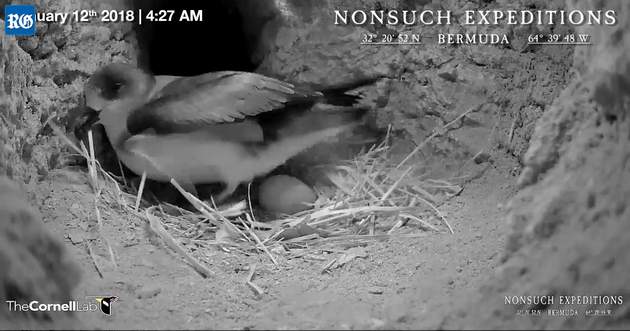Recent News
Zoom Around the Sound hailed a successMonday, April 11, 2016
The Zoom Around the Sound event has raised more than $15,000 for educational and conservation programmes.
Miracle on the Beach
Monday, April 11, 2016
Green turtles, visitors from the Caribbean, can be seen year round in Bermuda, August 2015 was the first time in over 100 years that green turtles had hatched from eggs laid on the island.
“Exploring Bermuda’s Flying Flowers” Event
Sunday, April 10, 2016
A lecture — “Exploring Bermuda’s Flying Flowers: The Seven Resident Butterflies Of Bermuda” — will be held at 7.00pm at Wednesday April 20th.
WILD Tales Spring 2016
Friday, April 01, 2016
Bermuda Zoological Society's Spring 2016 WILD Tales.
Hawk’s road to recovery
Wednesday, March 30, 2016
A rare Pigeon Hawk has been nursed back to health by staff at the Bermuda Aquarium Museum and Zoo after it was found stricken and unable to fly in a garden.
About
GovernanceAbout Us
Newsletter
Latest News
Gift & Bookstore
Contact
General Inquiries
info@bzs.bm
Latest News
All the latest updates and news from the Bermuda Aquarium, Museum, and Zoo, one of Bermuda's leading visitor attractions!
Owain Johnston-Barnes
Published Jan 15, 2018 at 8:00 am (Updated Jan 15, 2018 at 12:20 am)

This year’s cahow breeding season could be a record breaker, experts predicted yesterday.
Two thirds of the 125 known breeding pairs were nursing eggs by Friday.
And viewers of the CahowCam — a livestream of a nest on breeding site Nonsuch Island — were able to watch one of the endangered birds lay its single egg early yesterday morning.
Jean-Pierre Rouja, team leader of conservation group Nonsuch Expeditions, said the egg was laid at about 4.30am and marked the start of the sixth CahowCam season.
Mr Rouja added that the Bermuda team had signed off at 3am, but their partners from US-based Cornell Lab of Ornithology, who are in Hawaii to install a similar camera to track albatrosses, tweeted the event and alerted Bermuda.
Mr Rouja said that last year, with the support of Cornell, the CahowCam reached 600,000 international viewers who watched a total of 8.5 million minutes of footage.
He added: “As we expand the project, including new ways for our viewers and students to engage, we expect to greatly exceed those numbers this season.”
The same pair of cahows has used the filmed nest since 2009.
Jeremy Maderios, government chief conservation officer, said the pair’s egg last year took 51 days to hatch. Male and female birds take turns to care for the egg.
Mr Madeiros said: “After a record-breaking nesting season last year with 61 chicks fledging out to sea, we seem to be on track for breaking even more records this year.”
The majority of incubating adult cahows he had examined were heavier than normal, with some male birds approaching 500 grams.
Mr Madeiros said that suggested the birds had found good feeding conditions north of the Gulf Stream over the last month.
To watch the livestream, visit Nonsuchisland.com.
Anyone interested in updates on the cahows can also sign up for the Nonsuch Expedition Newsletter and select the CahowCam alert option.


